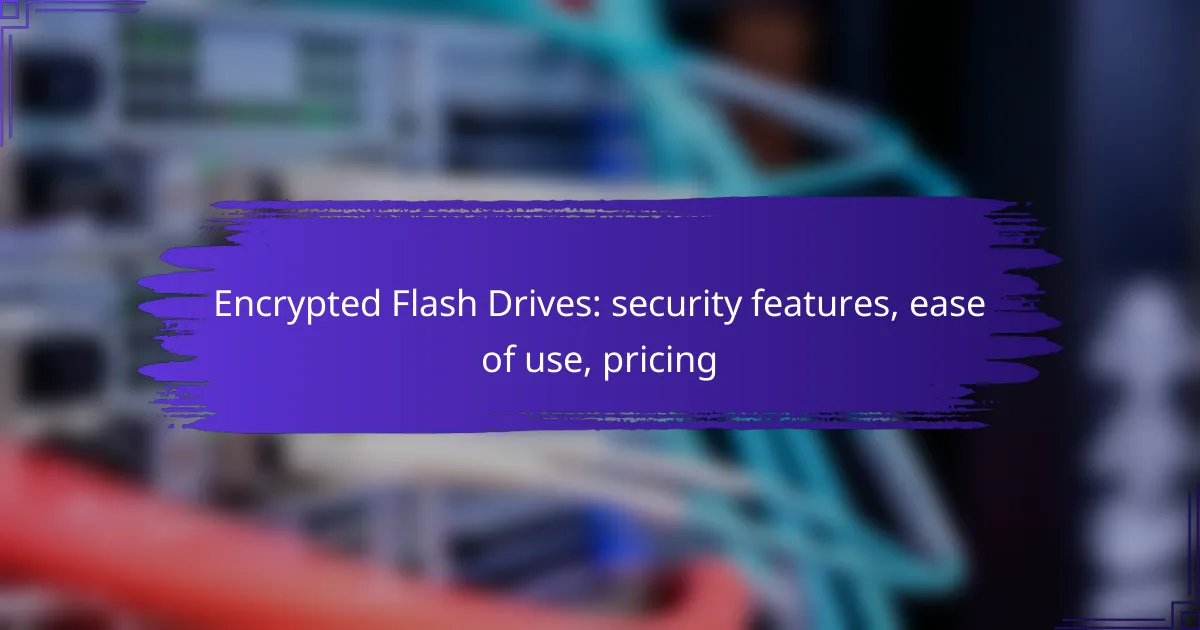Encrypted flash drives provide a vital solution for safeguarding sensitive information, combining advanced security features with ease of use. With hardware encryption, password protection, and secure access protocols, these drives ensure that data remains inaccessible to unauthorized users, even if lost or stolen. Their user-friendly designs allow individuals to protect their data effortlessly, making them an essential tool for anyone concerned about data privacy.
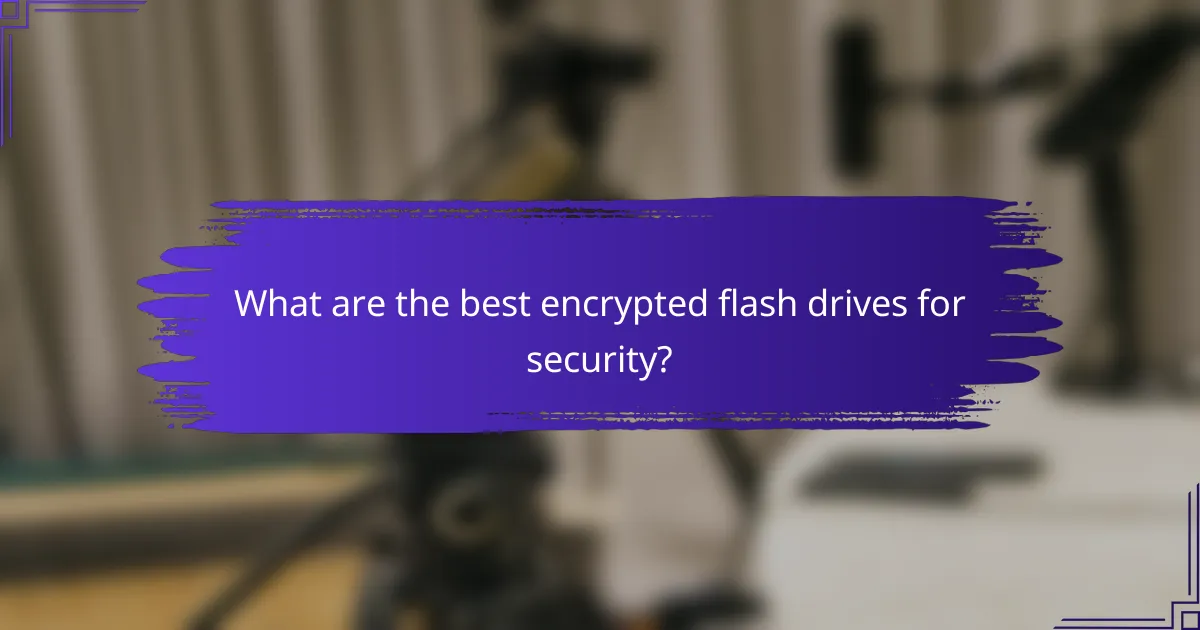
What are the best encrypted flash drives for security?
The best encrypted flash drives combine robust security features with user-friendly designs. These drives typically offer hardware encryption, password protection, and secure access protocols to safeguard sensitive data from unauthorized access.
SanDisk Extreme Pro Secure
The SanDisk Extreme Pro Secure is known for its high-speed performance and advanced security features. It utilizes hardware encryption with AES 256-bit encryption, ensuring that your data remains protected even if the drive is lost or stolen.
This drive is easy to use, featuring a simple setup process that allows users to create a password for access. It also offers a durable design, making it suitable for both personal and professional use.
Kingston DataTraveler Vault Privacy
The Kingston DataTraveler Vault Privacy is designed specifically for secure data storage, featuring strong AES 256-bit encryption. It includes a built-in password protection mechanism that locks the drive after a set number of failed attempts, adding an extra layer of security.
This drive is compatible with various operating systems, making it versatile for different users. Its rugged design ensures durability, while its straightforward interface allows for quick and easy file transfers.
Verbatim Secure Pro
The Verbatim Secure Pro offers a balance of security and convenience, featuring AES 256-bit hardware encryption. This drive is equipped with a user-friendly software interface that guides users through the encryption process, ensuring that data is securely stored.
With a focus on portability, the Verbatim Secure Pro is compact and lightweight, making it easy to carry. It is suitable for both personal and business applications, providing reliable protection for sensitive information.
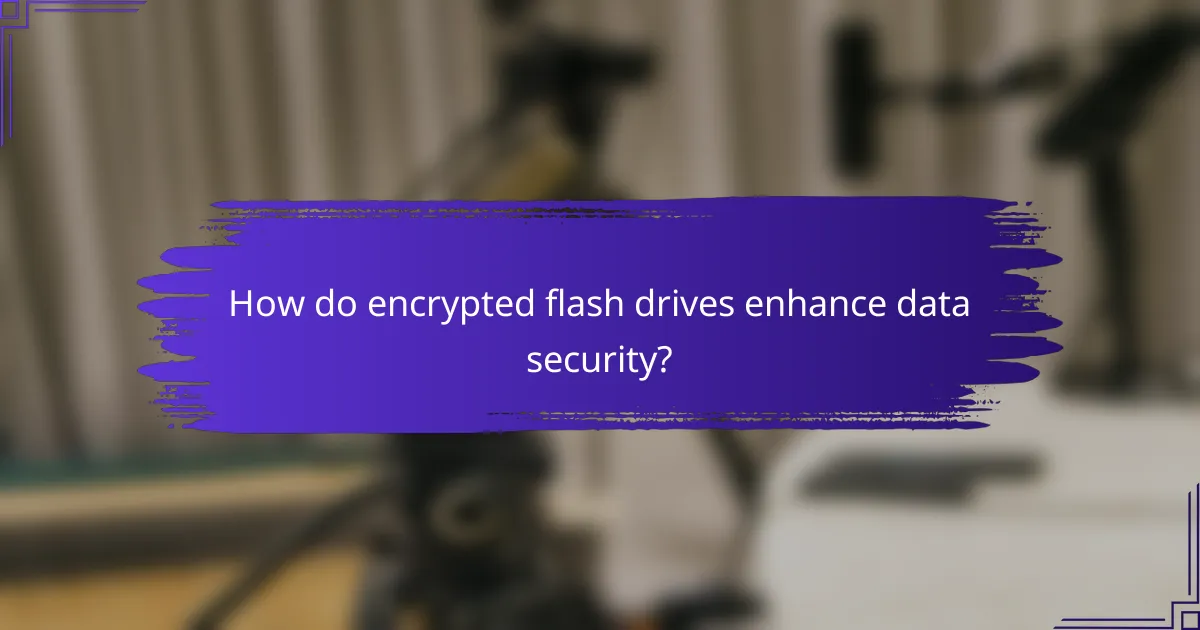
How do encrypted flash drives enhance data security?
Encrypted flash drives enhance data security by protecting sensitive information through encryption methods that render data unreadable without proper access credentials. This ensures that even if the drive is lost or stolen, unauthorized users cannot access the stored data.
Hardware encryption
Hardware encryption involves built-in encryption chips that automatically encrypt data as it is written to the drive. This method is often faster and more secure than software encryption, as it operates independently of the host computer’s operating system. Drives with hardware encryption typically comply with standards like FIPS 140-2, making them suitable for sensitive data storage.
When selecting a hardware-encrypted flash drive, consider factors such as the encryption algorithm used (e.g., AES-256) and whether the drive supports features like password protection or biometric access. These features can significantly enhance security.
Software encryption
Software encryption relies on applications to encrypt and decrypt data before it is stored on the flash drive. While this method can be more flexible and user-friendly, it may be slower and more vulnerable to malware or hacking attempts. Users must ensure that the software is regularly updated to protect against security vulnerabilities.
Common software encryption tools include VeraCrypt and BitLocker, which allow users to create encrypted volumes on their drives. Always choose software that offers strong encryption standards and is compatible with your operating system.
Data loss prevention features
Data loss prevention (DLP) features help protect against accidental data loss or unauthorized access. Many encrypted flash drives come equipped with functionalities such as automatic data backup, remote wipe capabilities, and access logs that track who accessed the drive and when.
When evaluating DLP features, look for drives that offer multi-factor authentication and the ability to set access permissions for different users. These features can provide an additional layer of security, especially in corporate environments where sensitive information is frequently handled.
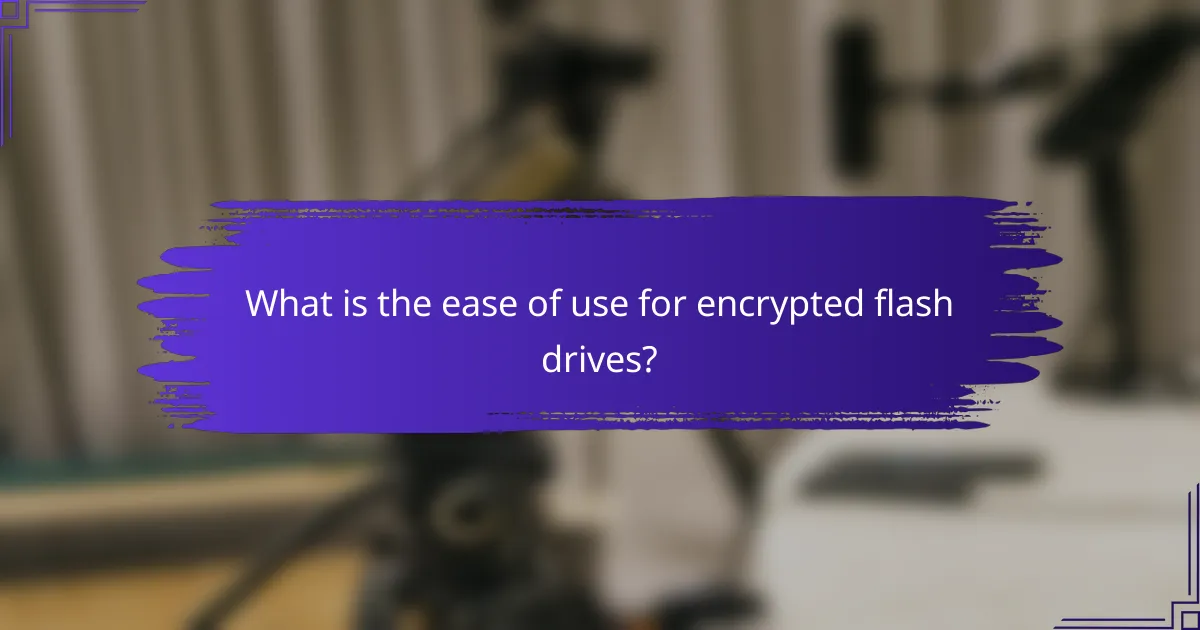
What is the ease of use for encrypted flash drives?
Encrypted flash drives are designed to be user-friendly while providing robust security features. Most models offer straightforward operation, allowing users to easily access and protect their data without extensive technical knowledge.
User-friendly interfaces
Many encrypted flash drives come with intuitive interfaces that simplify the user experience. Features like drag-and-drop functionality and clear prompts help users manage their files without needing advanced skills. Some drives even include software that guides users through encryption and file management processes.
Cross-platform compatibility
Encrypted flash drives typically support multiple operating systems, including Windows, macOS, and Linux. This compatibility ensures that users can access their secure files on various devices without hassle. However, it’s essential to check the specific model’s compatibility to avoid issues when switching between systems.
Setup and installation processes
Setting up an encrypted flash drive usually involves a few simple steps, such as connecting the drive, installing any necessary software, and configuring security settings. Most drives allow users to set a password or use biometric authentication, which can be completed in minutes. Users should follow the manufacturer’s instructions closely to ensure proper setup and avoid common pitfalls, like forgetting passwords or failing to back up recovery keys.
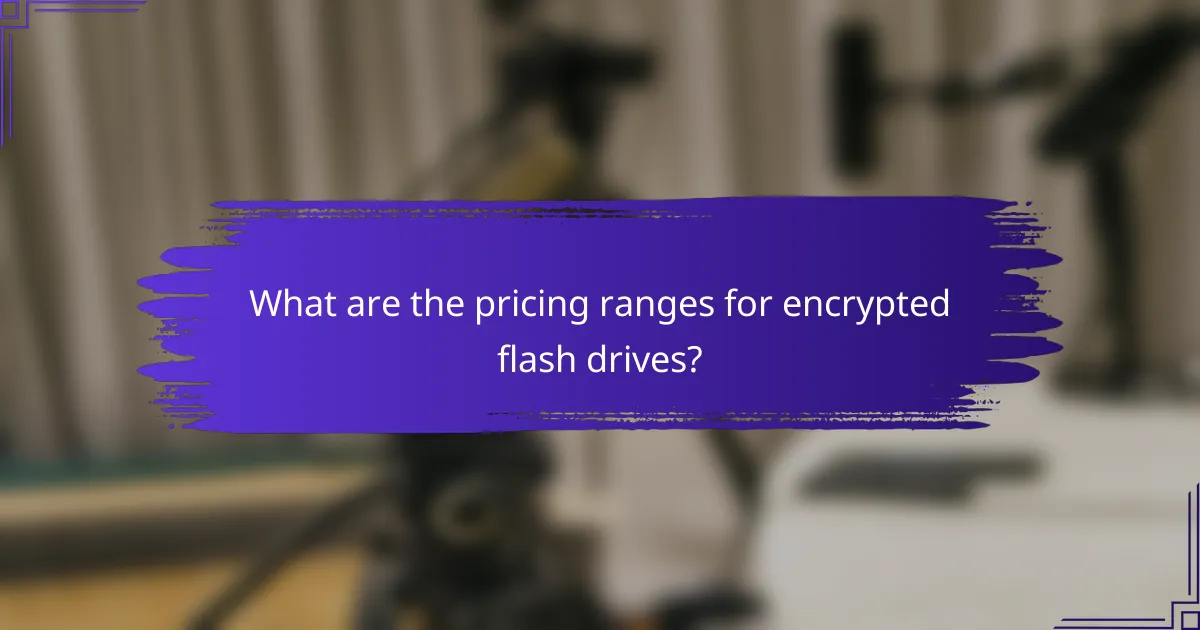
What are the pricing ranges for encrypted flash drives?
Encrypted flash drives typically range in price from around $20 to over $200, depending on features, storage capacity, and brand reputation. Understanding these pricing tiers can help you choose a drive that balances security needs with budget constraints.
Budget options under $50
Budget encrypted flash drives under $50 often provide basic security features such as password protection and hardware encryption. While these drives are suitable for general use, they may have lower storage capacities, typically ranging from 16GB to 64GB.
When selecting a budget option, look for drives that support AES 256-bit encryption, which is a widely accepted standard. Brands like Kingston and SanDisk offer reliable models in this price range.
Mid-range options $50-$100
Mid-range encrypted flash drives priced between $50 and $100 generally offer enhanced security features and larger storage capacities, often from 64GB to 256GB. These drives may include biometric security or advanced encryption protocols for added protection.
Consider drives from reputable brands such as Verbatim or Apricorn, which provide a good balance of security and usability. These options are ideal for professionals who need to secure sensitive data without breaking the bank.
Premium options over $100
Premium encrypted flash drives over $100 are designed for users who require top-tier security and performance. These drives often feature capacities of 256GB and above, along with advanced security measures like two-factor authentication and remote wipe capabilities.
Brands like IronKey and Corsair are known for their high-end models, which cater to businesses and individuals who prioritize data protection. Investing in a premium drive can be worthwhile if you handle highly sensitive information regularly.
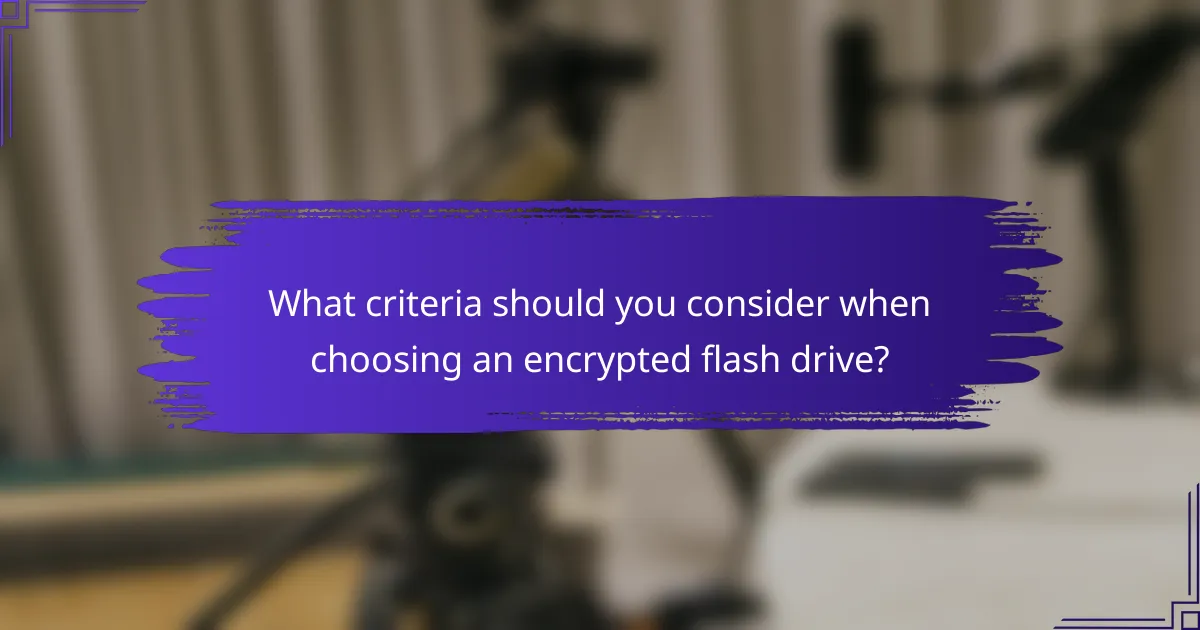
What criteria should you consider when choosing an encrypted flash drive?
When selecting an encrypted flash drive, focus on encryption standards, storage capacity, and brand reputation. These factors will significantly impact the security, usability, and reliability of your device.
Encryption standards
Encryption standards are crucial for ensuring the security of your data. Look for drives that use AES (Advanced Encryption Standard) with at least 256-bit encryption, as this is widely regarded as secure. Some drives may also offer additional features like hardware encryption, which can enhance protection against unauthorized access.
It’s essential to verify whether the encryption is software-based or hardware-based. Hardware encryption is generally faster and more secure, as it operates independently of the host system, reducing the risk of software vulnerabilities.
Storage capacity
Storage capacity is another key consideration when choosing an encrypted flash drive. These drives typically range from a few gigabytes to several terabytes. Assess your needs based on the types of files you plan to store, such as documents, images, or videos.
For general use, a drive with 32GB to 128GB is often sufficient, while larger capacities are better for extensive data storage or backups. Keep in mind that higher capacity drives may come at a premium price, so balance your storage needs with your budget.
Brand reputation
Brand reputation plays a significant role in the reliability and performance of encrypted flash drives. Research well-known brands that have a history of producing secure and durable products. Look for user reviews and expert recommendations to gauge the effectiveness of their encryption and overall quality.
Additionally, consider the warranty and customer support offered by the brand. A reputable manufacturer will typically provide a solid warranty and responsive customer service, which can be invaluable if you encounter issues with your device.
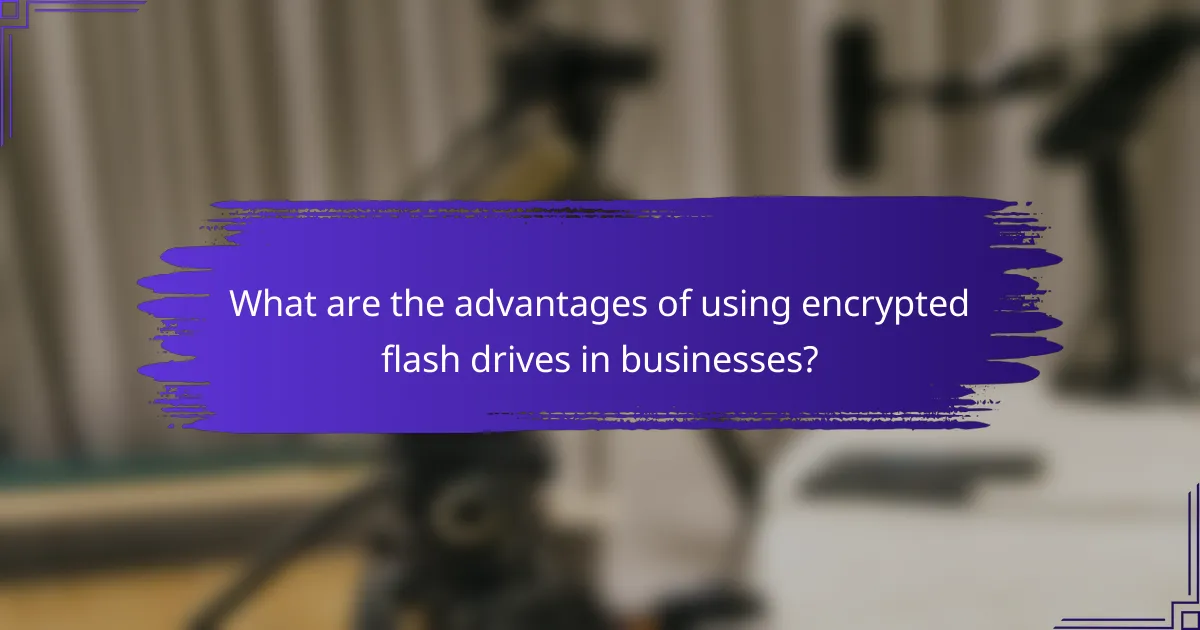
What are the advantages of using encrypted flash drives in businesses?
Encrypted flash drives provide enhanced security for sensitive data, making them essential for businesses that handle confidential information. They protect against unauthorized access and data breaches, ensuring compliance with various regulations.
Security features of encrypted flash drives
Encrypted flash drives utilize strong encryption algorithms to protect data stored on the device. Common standards include AES-256, which is widely regarded for its robustness. This encryption ensures that even if the drive is lost or stolen, the data remains inaccessible without the correct password or authentication method.
Many encrypted drives also feature additional security measures such as biometric authentication, which requires a fingerprint to unlock the device, and hardware-based encryption that secures data at the hardware level. These features significantly reduce the risk of data breaches.
Ease of use
Encrypted flash drives are designed to be user-friendly, often requiring minimal setup. Users typically need to create a password or set up biometric access upon first use, after which the drive functions like any standard USB drive. This simplicity allows employees to quickly adapt without extensive training.
Some models offer software that can automatically encrypt files as they are transferred, streamlining the process further. However, users should remember to keep their passwords secure, as losing them can lead to permanent data loss.
Pricing of encrypted flash drives
The pricing of encrypted flash drives can vary significantly based on storage capacity and security features. Basic models may start around $20 for lower capacities, while high-capacity drives with advanced security features can cost upwards of $100 or more.
When considering budget, businesses should evaluate the cost of potential data breaches against the investment in secure drives. Opting for reputable brands may incur higher upfront costs but can provide better long-term security and reliability.
